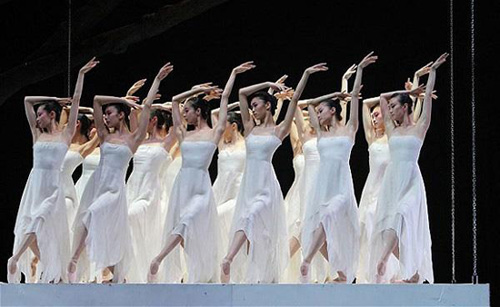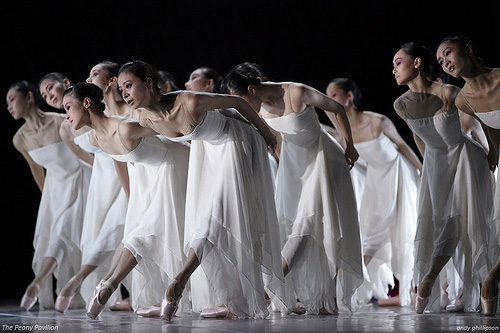Why the Peony Pavilion Matters for China Business

Op-Ed Commentary:Chris Devonshire-Ellis
Sept. 1 – The Peony Pavilion, a Chinese ballet, has been the opening dance event of this year’s Edinburgh Festival and, despite some initial hawkish comments about hosting a ballet from a country whose human rights are not respected, it has for the most part been a spectacular and very well-received production. The story itself dates from a Chinese classic play of the same title, written by China’s equivalent of Shakespeare, Tang Xianzu in 1598. (Had intercontinental air travel existed at that time, they may well have collaborated. The Bard wrote “Much Ado About Nothing” that same year)
The play, which has also appeared in many different versions of Chinese opera, is a production of the National Ballet of China, itself founded in 1959 but with an unusual task – to concentrate on the basis of Western classical ballet, and not Chinese dance. That’s rather like George Balanchine eschewing the New York City ballet to devote himself to Tai Chi. This brand new production also however offers rather more. Far from the exotic, almost fearfully high pitched timbre of much Chinese classical music, or rehashes of Swan Lake, the score to the Peony Pavilion has been written exclusively for this ballet by Guo Wenjing, a contemporary composer, much in the style of Debussy or Ravel. Who, we may ask?
While artists such as Lady Gaga and countless others invade China’s ears with their bland nonsense passed off as art for the teens, what do we know of Chinese musicians? Most expats would be hard pushed to mention any artist in any genre aside from the sculptor Ai Weiwei, and then only due to his recent imprisonment (which made global news media owners rub hands with glee, they managed to shift a lot of newspaper coverage). Other than that, Faye Wong?
Simon Rattle, meanwhile, plays this week at the Shanghai Grand Theater. Guo, on the other hand, has had his work played by many of China’s big orchestras, but also by groups as diverse as The Kronos Quartet, The Modern Ensemble, and the Arditti Quartet. These are powerful names, Guo is a revered musician. Yet, I wonder, what percentage of foreign businessmen and women in China have ever heard of him, or the ballet? Rattle of course is a household name for many in China; meaning that the reciprocal recognition is not there, and the West is in danger of falling behind in knowledge due to this gap. We, quite literally, do not appreciate China. Woe betide us if they know more about us than we do about them. Business wouldn’t stand for no competitor knowledge, yet there is nothing in China-focused MBA courses about getting to grips with its culture.

This matters because China is changing. It always has of course, yet I have found that the direction of its business environment has been determined long before the analysts have cottoned onto a theme. With no data, no trends, how can anything be critiqued or understood? Pure reliance on analytical stats misses the point. The Peony Pavilion, with its new contemporary score, outstanding modern choreography (wonderful work by Fei Bo), and its exquisite form of expression, tells us (way before any analytical trends) of a new China, and one that will change us all. Although the cultural root remains a 16th Century Chinese classic, one dismisses this with as much credibility as to suggest Shakespeare is no longer relevant. Contemporary Chinese culture then, can advise those of us earning a living from or with China much about the state of play as concerns future directions. In this ballet, both Chinese forms and Western forms sit equally well, side-by-side. The Peony Pavilion is fusion, and dictates the way we should all start to think about our businesses and the strategies required to ensure they maintain their relevance.
To understand China, and to predict its future, we need to get to understand its culture. When it comes packaged with as much attention to detail, history and beauty as the Peony Pavilion has, it’s really a bit of a no-brainer. The China pretenders and wannabe’s may scoff, but corporate direction in business today can be gleaned in part from productions such as these. China business is not purely about laws, taxes, MBA courses or speaking Mandarin. It’s about immersion, adaption, and integration. Culture has always been a historic barometer towards future trends, and success in China business demands its involvement.
Understanding Chinese culture is as important a component of understanding China business as laws, regulations and politics. It’s the marriage of both that will determine those businesses who can adapt, learn and prosper. For this, the Peony Pavilion should be required viewing for any businessman wanting to understand where China is headed.
Chris Devonshire-Ellis is the principal and founding partner of Dezan Shira & Associates, a foreign direct investment practice advising international companies on matters of law, tax and compliance within China. The firm possesses 12 China offices and has been operational in the country since 1992. Chris also hosts the China Expat web site, designed to showcase Chinese art, history and literature to foreign executives interested and involved with China. He may be contacted at chris@dezshira.com.
Related Reading
The Choijid Tara – A Mongolian Ballet Masterpiece
The Importance of Art and Culture in Understanding China Business
- Previous Article China Formalizes Security Review Rules for Inward M&As
- Next Article VAT General Taxpayer Status Important for FICEs









